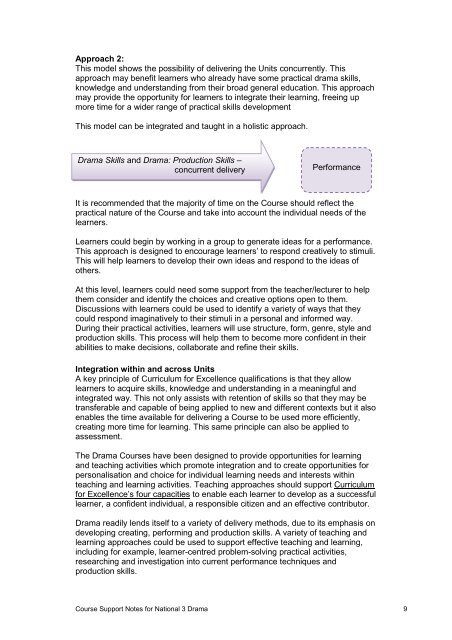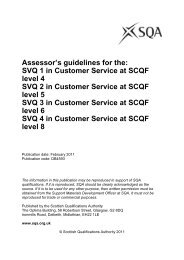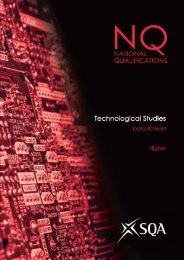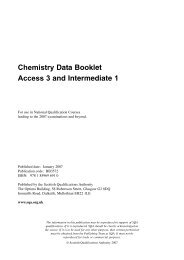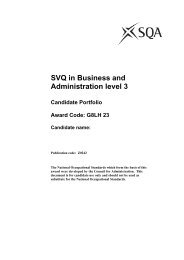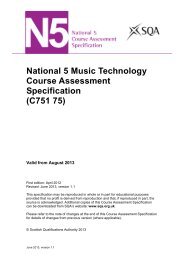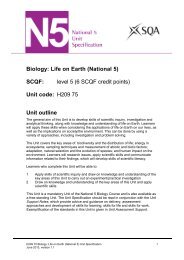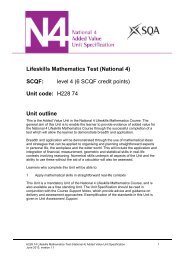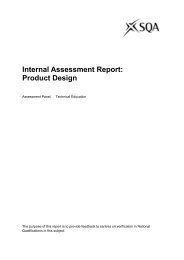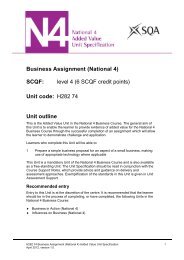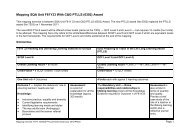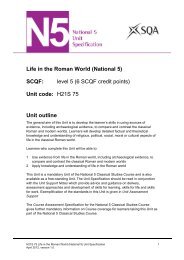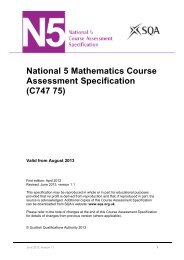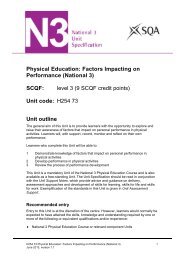National 3 Drama Course Support Notes - Scottish Qualifications ...
National 3 Drama Course Support Notes - Scottish Qualifications ...
National 3 Drama Course Support Notes - Scottish Qualifications ...
Create successful ePaper yourself
Turn your PDF publications into a flip-book with our unique Google optimized e-Paper software.
Approach 2:<br />
This model shows the possibility of delivering the Units concurrently. This<br />
approach may benefit learners who already have some practical drama skills,<br />
knowledge and understanding from their broad general education. This approach<br />
may provide the opportunity for learners to integrate their learning, freeing up<br />
more time for a wider range of practical skills development<br />
This model can be integrated and taught in a holistic approach.<br />
<strong>Drama</strong> Skills and <strong>Drama</strong>: Production Skills –<br />
concurrent delivery<br />
Performance<br />
It is recommended that the majority of time on the <strong>Course</strong> should reflect the<br />
practical nature of the <strong>Course</strong> and take into account the individual needs of the<br />
learners.<br />
Learners could begin by working in a group to generate ideas for a performance.<br />
This approach is designed to encourage learners’ to respond creatively to stimuli.<br />
This will help learners to develop their own ideas and respond to the ideas of<br />
others.<br />
At this level, learners could need some support from the teacher/lecturer to help<br />
them consider and identify the choices and creative options open to them.<br />
Discussions with learners could be used to identify a variety of ways that they<br />
could respond imaginatively to their stimuli in a personal and informed way.<br />
During their practical activities, learners will use structure, form, genre, style and<br />
production skills. This process will help them to become more confident in their<br />
abilities to make decisions, collaborate and refine their skills.<br />
Integration within and across Units<br />
A key principle of Curriculum for Excellence qualifications is that they allow<br />
learners to acquire skills, knowledge and understanding in a meaningful and<br />
integrated way. This not only assists with retention of skills so that they may be<br />
transferable and capable of being applied to new and different contexts but it also<br />
enables the time available for delivering a <strong>Course</strong> to be used more efficiently,<br />
creating more time for learning. This same principle can also be applied to<br />
assessment.<br />
The <strong>Drama</strong> <strong>Course</strong>s have been designed to provide opportunities for learning<br />
and teaching activities which promote integration and to create opportunities for<br />
personalisation and choice for individual learning needs and interests within<br />
teaching and learning activities. Teaching approaches should support Curriculum<br />
for Excellence’s four capacities to enable each learner to develop as a successful<br />
learner, a confident individual, a responsible citizen and an effective contributor.<br />
<strong>Drama</strong> readily lends itself to a variety of delivery methods, due to its emphasis on<br />
developing creating, performing and production skills. A variety of teaching and<br />
learning approaches could be used to support effective teaching and learning,<br />
including for example, learner-centred problem-solving practical activities,<br />
researching and investigation into current performance techniques and<br />
production skills.<br />
<strong>Course</strong> <strong>Support</strong> <strong>Notes</strong> for <strong>National</strong> 3 <strong>Drama</strong> 9


